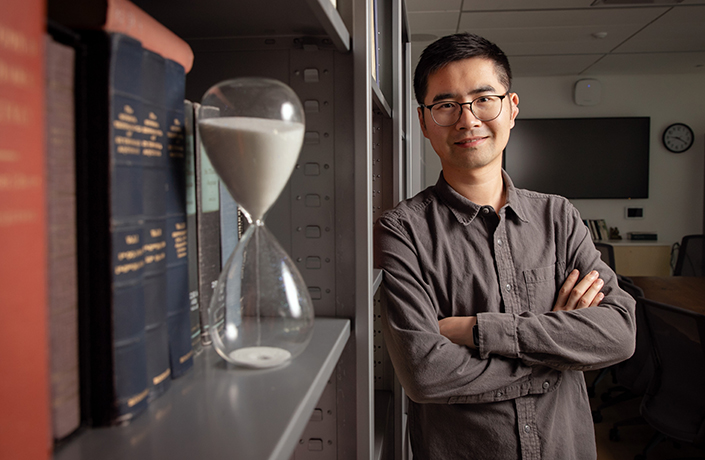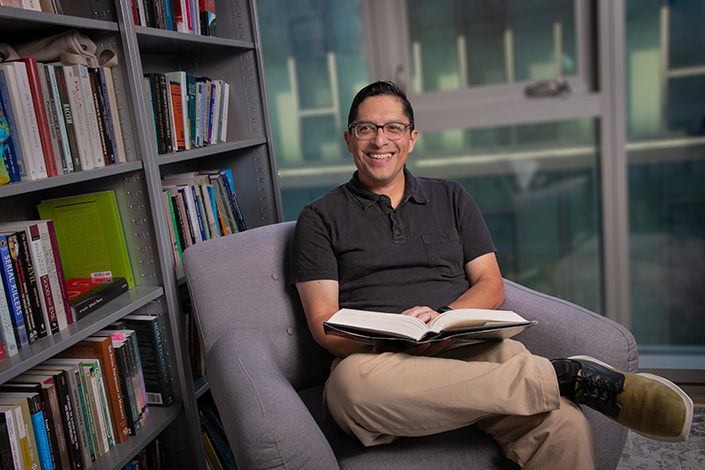Free Will: A Metaphysical Force or Social Mediator?
Story by:
Published Date
Article Content
We make tens of thousands of decisions each day. Are these choices simply a reaction to what happened in the past? Or are we hardwired to choose what is least likely to endanger our social status?
Two UC San Diego philosophers in the School of Arts and Humanities are examining a centuries-old debate about the nature of free will from two angles—whether the universe’s makeup allows for the freedom of choice and the way free will functions in society as a method of cooperation. These topics are the subject of a course they are co-leading this quarter, a unique merger between historically distinct philosophical themes.
Associate Professor Eddy Keming Chen, a philosopher of physics, presents an argument that has turned heads in the field. What if our universe could be described by quantum mechanics (notoriously vague in probabilities) while also being rigidly deterministic, a quality typically characterized by classical physics? His work points to a single law that defines one history of our universe.
At the social and psychological level, Professor Manuel Vargas suggests our beliefs about free will need revision. Rather than debate its existence, he seeks to transform our understanding about how freedom of choice functions as a tool for social regulation. Making connections between our behaviors and moral responsibility, Vargas demonstrates that free will is linked to our need to cooperate.
Our future is fixed
As a philosopher of physics, Chen is fascinated by big questions like whether the start of the universe can be described by a single law and the ways in which free will and determinism can coexist. He has recently stirred a contentious debate about whether the universe could have a single trajectory. One of his latest publications, (Nature: “The Preordained Quantum Universe”), draws a provocative parallel between two traditionally incompatible viewpoints.

On one side of the argument are classical physicists who believe that everything that has happened can be explained by what happened before—think Isaac Newton’s laws of motion from the 17th century. This theory presents the universe’s story as wholly predetermined.
Nearly 300 years later, quantum physics emerged, which seemed to counter classical physics. Instead of a highly predictable history, this theory explains the world in probabilities. There are multiple options for how the universe unfolds; the only way to know which one is happening is to measure it.
“From a certain perspective, the quantum universe is more deterministic than a classical one, providing stronger explanations and better predictions,” argues Chen in Nature. “That has consequences for humans, too, because that makes it harder to appeal to quantum theory to defend free will.”
In the 1980s, theoretical physicists Jim Hartle and Stephen Hawking applied quantum mechanics to the entire universe, proposing that it’s guided by one massive but simple wavefunction. A wavefunction is a tool in quantum mechanics to discover the different states of particles in the universe—like their position, how fast they are moving or how much energy they are producing.
If the universe can be defined by a simple wavefunction, all that has happened and will happen could be traced back to a single equation. In other words, if we are passengers on a train, we only have one track to travel.
Chen takes this idea of a single train track and applies the notion of classical determinism. In fact, he calls quantum mechanics strongly deterministic, with absolutely no room left for chance. For a theory that has historically favored flexibility, the argument is sparking dialogue (see Scientific American, “Has Quantum Physics Determined Your Future?”).
“Physicists have conventionally liked determinism’s predictive and explanatory power,” said Chen. “Others, including some philosophers, have generally been more divided, not least because of how determinism might seem to preclude human free will.”
In a strongly deterministic universe, Chen also points out that counterfactuals can’t exist. These “what-if” scenarios evaporate because there are no other possibilities to entertain. The original law (wavefunction) has already decided what is to be.
“If the laws of physics are deterministic, and our actions are just the summation of particle interactions, there seems to be no room for us to freely choose A instead of B because the earlier states of the universe will already have determined the outcome of our choice,” said Chen. “And if we are not free, how can we be praised or blamed for our actions?”
The freedom to behave rightly
Praise and blame—and the role of free will in upholding rules in society—is a topic that Vargas has explored deeply. It’s through this lens that he seeks to revise the notion of free will. Instead of focusing on whether or not it exists, Vargas studies the practical implications of free will as a tool for norm enforcement.
“I think we have a false belief about what free will is,” explained Vargas in his recent chapter on revisionism in “Four Views on Free Will.” “The version I defend holds that free will exists, it is compatible with the possibility of determinism and its distinctive features are a function of its mediating various practical and social interests.”
Examining how free will functions in our communities is just one way of classifying an idea that has divided scholars for ages. Popularly thought of as an individual freedom to make value-based decisions, Vargas expands the concept of free will to be interpersonal in nature.
“If the laws of physics are deterministic, and our actions are just the summation of particle interactions, there seems to be no room for us to freely choose A instead of B because the earlier states of the universe will already have determined the outcome of our choice. And if we are not free, how can we be praised or blamed for our actions?”

According to Vargas, free will is a kind of control that serves as social mediator. As a community, we collectively come to agreement on what is permissible and punishable. And as individuals faced with a decision, we deliberate on what to do, partly in light of our own interests, and partly based on an awareness about how our actions will be thought of in the context of community standards.
How do we get cooperation, given that individual interests conflict, and it isn't always in our interest to go along with community standards? Anger, and other strong emotions, are powerful motivators. The attraction toward misbehaving is tempered when the consequences can range from irate confrontation to retaliation—which can result in an even greater loss than the original transgression. Vargas notes that this anger can be directed on behalf of others, as well as at oneself.
“We have pressures for having anger that is a response to perceived wrongdoing of other agents, and that anger motivates us to either seek confrontation or to impose costs in response to that action.”
Are there any circumstances when discipline or revenge is inappropriate? Vargas considered this question as well. Some culprits are exempt based on their lack of knowledge or ability, including young children and those afflicted by infirmities. Others are forgiven when they offer an excuse, for instance if they were unaware of the rule or the incident was an accident. Sometimes individuals cause trouble from being reckless, but there was no evil intent. While other situations involve coercion, forcing one course of action.
When wrongdoing happens with intent to violate moral rules, most people are willing to accept blame to retain their place in society, Vargas describes. “We want to enjoy the statuses and privileges of those who are regarded as fully mature, sufficiently competent members of a community that depends on relatively complex norms of cooperation and coordination.”
This system functions well interpersonally, but begins to break down when digital technology comes into play. Online shaming and cancel culture has risen, but doesn’t have the same impact in shaping our collective values. “These technologies allow us to condemn and praise but don't allow us to see the consequences of the praising and condemning,” said Vargas. “When someone violates a rule, a great amount of vitriol is directed at them; yet when it happens in large internet communities, and you don't have knowledge about people's situation or emotional states, it can become volatile and detrimental at scale.”
“I think we have a false belief about what free will is. The version I defend holds that free will exists, it is compatible with the possibility of determinism and its distinctive features are a function of its mediating various practical and social interests.”
Bridging an accidental divide
Chen and Vargas are co-leading a graduate seminar this quarter (Phil 230: Metaphysics) that uniquely bridges these two sets of philosophical conversations on free will, determinism and moral responsibility, which have diverged over time.
“Our class is reflecting an accidental divide in the philosophical literature,” said Vargas. “In modern philosophy, from the scientific revolution on, determinism started turning into more precise formulations as the science of physics began to emerge and take off.”
Chen added, “It's like two siblings who have grown apart. We are welcoming them into the same room, getting them to talk again. They have a lot to contribute to each other.”
Interdisciplinarity is at the heart of the Department of Philosophy, which is ranked top 10 globally in five specialties by The Philosophical Gourmet. Questions about moral conflict, the nature of cognition, the function of free will and examinations of the practice of science intersect with research in technology, health, science, humanities and more. Many experts are involved in the Institute for Practical Ethics, a research unit that draws scholars from across the university to create socially responsible science and policy.
You May Also Like
Stay in the Know
Keep up with all the latest from UC San Diego. Subscribe to the newsletter today.




